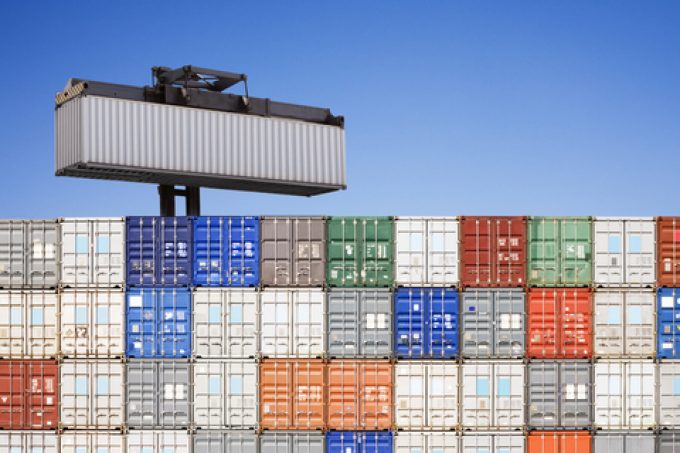Container spot rates have peaked as all major trades see prices fall
There was more evidence in this week’s container port freight markets that peak prices on ...
TFII: SOLID AS USUALMAERSK: WEAKENINGF: FALLING OFF A CLIFFAAPL: 'BOTTLENECK IN MAINLAND CHINA'AAPL: CHINA TRENDSDHL: GROWTH CAPEXR: ANOTHER SOLID DELIVERYMFT: HERE COMES THE FALLDSV: LOOK AT SCHENKER PERFORMANCEUPS: A WAVE OF DOWNGRADES DSV: BARGAIN BINKNX: EARNINGS OUTODFL: RISING AND FALLING AND THEN RISING
TFII: SOLID AS USUALMAERSK: WEAKENINGF: FALLING OFF A CLIFFAAPL: 'BOTTLENECK IN MAINLAND CHINA'AAPL: CHINA TRENDSDHL: GROWTH CAPEXR: ANOTHER SOLID DELIVERYMFT: HERE COMES THE FALLDSV: LOOK AT SCHENKER PERFORMANCEUPS: A WAVE OF DOWNGRADES DSV: BARGAIN BINKNX: EARNINGS OUTODFL: RISING AND FALLING AND THEN RISING

Freightos claims to be able to offer guaranteed container capacity on ships, in a new feature on its booking platform.
The company said importers and exporters of all sizes can book “well-priced, guaranteed container space via an Asia-based vendor”.
It said the feature would “democratise” the market, allowing SMEs the ability to book capacity directly.
But the service raises several questions: notably, how can Freightos guarantee space when the shipping lines won’t?
Freightos chief executive, Ruthie Amaru, told The Loadstar that the company has agreed space with a specific vendor for FCL shipping, “on ex-Asian lanes where we see the majority of our trade and where the industry has experienced the tightest capacity limitations”.
“Any carrier or freight forwarder can opt in, but for now it’s on limited lanes where the supplier is able to guarantee space.”
She added that the company is working on “additional vendor agreements”, which will be available soon. But she declined to say how much capacity Freightos has secured.
“We can’t share exactly how much capacity the vendor has secured but can confirm that together with our partners, we are well-positioned to secure more should it be necessary.”
With shipping prices at an all-time high, does “guaranteed” space come at a premium?
“Like many results on our freight marketplace, quotes from forwarders have a fairly high variance across price,” she explained. “Depending on the lane and the provider, guaranteed capacity does not necessarily cost more than regular spot rates. “In fact, in the time it’s been running, some Guaranteed Capacity quotes have been among the most competitive available on Freightos.com. This is one of the biggest advantages of a marketplace model – leveraging variance across providers to help accommodate importers and exporters of all sizes.”
The idea that space can be guaranteed rather undermines bookings which are not guaranteed. Are other bookings pointless?
“Much like the rest of the logistics industry, many freight quotes are not tied to specific sailings,” said Ms Amaru.
“Particularly over the last year’s supply chain crunch, where rates have soared by over 10 times, some shipments have been delayed or rolled and consequently hit with additional fees. In order to minimise those occurrences as much as possible, we typically rely on data and a best-in-class set of operating procedures that have been developed together with our vendors and honed across tens of thousands of shipments.
“On a regular booking, the forwarder must employ his or her best efforts to ensure the shipment’s departure before the expiry (gate in) date of the quote. As space is not guaranteed, if the forwarder doesn’t find available space before the validity date they must inform the customer. Providers are carefully measured on performance across a number of areas; this is one that we track particularly closely.
“In a standard case, the forwarder must provide alternatives, which can include premium space, space with different carriers, delayed space with the same carrier at the updated price.
“With Guaranteed Capacity however, the forwarder must pass the guaranteed capacity booking to the carrier as soon as the booking is confirmed. The carrier then confirms the vessel and transit time detail.”
A recent survey by Freightos showed that 94% of SME shippers had experienced supply chain disruption, such as delays and high costs. But booking space on a specific vessel could mitigate some of the disruption.
Freightos users can find a “guaranteed capacity badge” on relevant quotes, which will then show the estimated departure time. When finalised, the forwarder can then book space directly with the carrier, via the platform.
Comment on this article
Stan Wraight
September 26, 2021 at 1:53 pmSo if I read this correctly, we now have another intermediary between the shipper and the carrier, a data provider? In air if this happens surely the Forwarder and GSSA will be bypassed? Or will it just be another situation where one more yield decreasing intermediary for the carrier is introduced. Amazing that airlines did not learn from their passenger colleagues and hotels of how this GDS system evolution was a very, very bad idea to support.